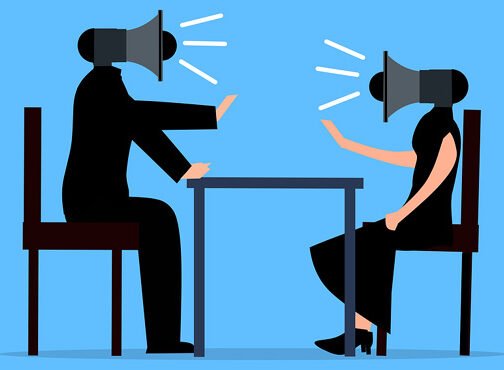TIPS ON HOW TO WIN AN ARGUMENT
There are certain qualities instilled in us right since our childhood ; the idea of getting into a confrontation or an argument is often linked with negativity. It’s often linked to feelings like violence, aggression or rejection. We are trained to have good manners and avoid such situations even if it’s insincere. There are times when we don’t agree with the people at our workplace or often, if not always, we have differences of opinion at home. But suppressing the need for an argument is also linked with resentment, as explained by Dominique Picard, a clinical sociologist “ We avoid jeopardizing our emotional security by avoiding conflict. Fleeing a confrontation means fleeing the danger it may bring. Psychologically, we do everything we can to avoid conflict.”
ARGUMENTS IN THE WORKPLACE
In modern workplace argument has become the “dirty word” after all conflict is anti productive and decreases employee satisfaction. Is it true though ? In her book, The Good Fight, Liane Davey explains the importance of having an argument at the workplace. She mentions the conflict that occurs within companies that require conflict to move forward but train their employees to avoid it. Differing viewpoints are required to propel conversations forward and force stakeholders to find the best solutions. How do you start a marketing campaign without disciplining the sales team? How do you allocate the budget among the various projects? How do you communicate the advantages of a new idea? These are all common questions that naturally cause friction and necessitate solutions. If these issues are neglected, the company’s financial wellbeing could suffer. Yes, conflict is necessary for an organization’s success. However, as humans, we resist dispute and accumulate conflict debt by disregarding and avoiding difficult decisions. This impacts career growth, as individuals fail to demonstrate their ability to handle tough situations. Our institutions are suffering as a result, becoming less constructive, inventive, and competent. Individuals are suffering too, with overburdened tasks, never-ending controversy, and intense anxiety.
WHAT IS AN ARGUMENT?
Claims backed by proper reasoning and supported evidence are called arguments. It is a social process and a very important one at that. Without it, mankind wouldn’t have reached the heights that it has ever since our existence. It’s only possible through arguing that humanity made advancements in areas like science, politics, and overall welfare. Individuals and groups can learn about issues through debate, which is an essential communication tool. Argument attempts to illuminate reasons by making them explicit and open to scrutiny. On an individual level, arguing helps us understand where the other person is coming from. It also improves body language, as strong nonverbal cues during arguments build confidence and persuasion.
TIPS THAT YOU CAN USE RIGHT AWAY
There are times when we don’t agree with the people at our workplace or often if not always, we have differences of opinion at home. Here are some tips and tricks that will help you in putting your best foot forward in making the other person accept your point. Here are some tips and tricks that will help you in putting your best foot forward in making the other person accept your point.
DO'S IN AN ARGUMENT
- KEEP YOUT COOL: It’s important to remain calm while arguing. Restlessness can make you forget your point or might make your body language inappropriate.
- BODY LANGUAGE IS THE KEY: A strong authoritative body language plays an important role in an argument. Simple gestures such as using your hands while explaining your point or changing your facial expressions to a more serious look will help in putting your points in a powerful way.


3. RESERACH ABOUT THE TOPIC: It’s important to know what you are arguing about in a detailed manner. There are various research papers available on different subjects on the internet. Reading about the subject to form an informed argument.
4. FACTS ARE YOUR FRIENDS: Something that will make your arguments hard to reject are my using facts and statistical figures to back your point. This provides your argument an extra edge.
5. OPEN ENDED QUESTIONS ARE THE WAY: Ask open ended questions while opposing a point. These questions require answers to be given in phrases and just a “yes” or a “no” response cannot be given for such questions.
6. ASK THE RIGHT QUESTION: Ask your opponent how he/she concluded the said argument rather than why.
7. USE VISUALS: Showing visuals to the audience while arguing makes them understand your point better and more appealing. If you visually demonstrate your point, it makes it even more relatable and logical than just using your words as your weapon


8. ARGUE LOGICALLY: It’s the utmost important thing while arguing, to argue with logic. Back your points with logic and make sure that every statement you put forward is logical or else you won’t come out as credible.
9. USE HIGHER VALUE STATEMENTS: Use statements while arguing that are hard to conflict. Statements such as “It’s completely unfair how gender inequality was so prevalent in our society”. Opposing such statements will make your opponent look unfair.
Don'ts in an argument
- RAISE YOUR VOICE: Raising one’s voice during an argument is not advised, one should use a deep voice to sound more authoritative, but shouting shouldn’t be an option. Shouting causes disruption in one’s thinking and decision making hence it should be avoided.
- GET TOO EMOTIONAL: Showing too much of your emotions while arguing can do more harm than good to your stance. When you get emotionally invested in an argument you might say things that don’t exactly fit the logic and might weaken your point.


3. TOUCH YOUERSELF: Avoid gestures that involve a negative body language such as rubbing your fingers or tapping your feet while the argument is going on as this might give the impression that you are under confident and not exactly sure about your point.
4. PERSONAL ATTACKS: Never get personal while making an argument. Back yourself with facts rather than accusing your opponent on a personal level. This might just take the argument to something not related to the topic and might also make you look weak.
5. NEGATIVE BODY LANGUAGE: Body language plays an important role in forming the right impression. One shouldn’t depict negative body language while arguing such as trying to get too close to your opponent or pointing fingers while arguing as this might come out as threatening signs.
6. USING “YOU”: Never start your arguments with “You always” or “you never” as this destroys the meaning of the whole argument and creates another problem than finding a solution to the already existing one.

CONCLUSION
It’s not always advised to avoid arguments, be it at the workplace or at your home. It makes your relations stronger and helps in being constructive. Argumentation is an art, one that everyone needs to master. It’s a communicative exercise and helps improve your communication as well as leadership skills. Influencing others with your arguing skills is a powerful skill especially in today’s society where everyone has such a strong set of opinions.
HOW WE CAN HELP
Your handshake speaks volumes about your confidence and professionalism. Learn how to avoid common mistakes and make a lasting impact in any meeting. If you are looking to upgrade your body language skills, check out our online pre recorded courses on various topics that come with lifetime access. Contact us for expert guidance at +91 9930941534


















